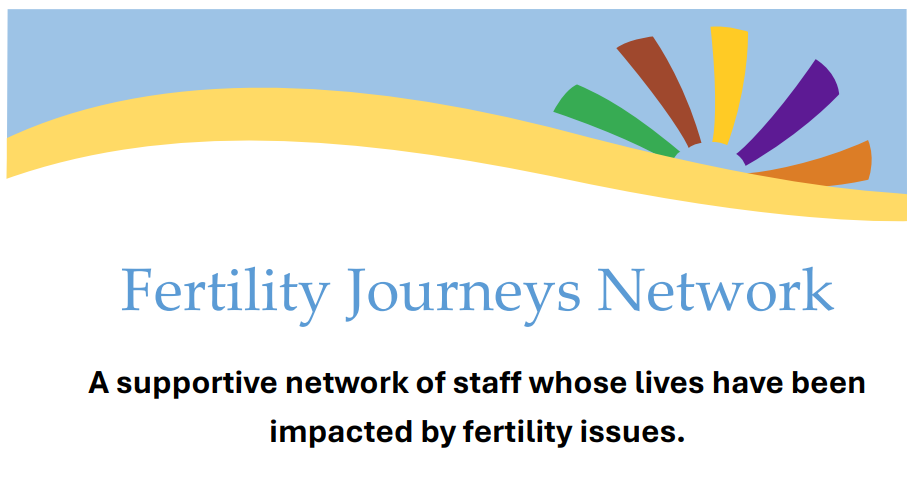
Lizzy Cottrell: Fertility Journeys Staff Network
Infertility affects around 1 in 6 people of reproductive age¹. At our University, with roughly 12,000 employees, this equates to around 2,000 current staff members experiencing some form of fertility issue during their lifetime. I’m just one of these people.
The causes of infertility are many and varied. Infertility also comes in different forms. My own experience is of secondary infertility which, simply put, is defined as someone who has previously conceived and given birth but is then unable to conceive and/or carry a subsequent pregnancy to term. I know I am extremely fortunate to have one child. But I also know the toll that six years of trying, without success, to give my daughter a sibling took on me and my family.
Anyone who has struggled with fertility issues or a desire to have a child will recognise the impact it has on their lives. It can be all-encompassing, and inevitably affects work life as well as everything else. Results of a survey conducted by Fertility Network UK (FNUK), released in 2022, highlight the wide-ranging impact of infertility on individuals, including its negative impact on mental health and career enjoyment and progression². Infertility is therefore absolutely an EDI issue, yet in most institutions it is barely talked about. Discussions around fertility/infertility are obviously deeply personal, and speaking about it is not for everyone; but perpetuating a culture where people feel unable to talk about something that affects so many of us can lead to individuals feeling isolated and alone.
Recently, a small group of University staff established a new peer support network, called ‘Fertility Journeys’ as part of the EDI Health Network. This network aims to connect staff across the University whose lives are impacted by fertility issues of any kind, and to provide a safe space for members to share their experiences. An additional goal of the network is to raise awareness of fertility issues amongst the wider University community. To address this, we have recently secured some support from the University’s EDI changemaker’s fund, which has enabled us to partner with FNUK’s Fertility in the Workplace team, and to draw on their expertise and resources.
For those who may not be aware, June is World Infertility Awareness Month. To mark this, the Fertility Journeys network will be hosting our first event, a webinar delivered by FNUK on ‘An Introduction to Fertility’, to be held on Tuesday 10th of June. This event really is for everyone, as even if you have not been personally affected by infertility, it is likely that someone you know – a friend, a family member or a colleague – has or will be affected. Understanding some of the key issues and knowing what to say (or what not to say!) can be a helpful starting point when supporting someone experiencing fertility issues.
Since opening up about my own fertility struggles, I’ve met many incredible people who have shared their own stories with me. Some who have created their families in different ways, including through the use of assisted reproductive technologies or adoption, and some who remain childless by circumstance. The sharing of experiences has, for me at least, been so important and has helped me steer through a tough period of life. By starting to break the taboo surrounding infertility and enabling more people to share their stories, I hope that this network can help to support others.
For anyone interested in finding out more about the Fertility Journeys network, please see the further information below, as well as links to additional resources to support staff experiencing fertility issues.
And for those of you in the middle of your own journey – please know that you are not alone, and I wish you the very best of luck.
Further information:
The Fertility Journeys staff network is hosted on a private Teams channel. For anyone that wishes to join this network, please get in touch with co-chairs Lizzy Cottrell (elizabeth.cottrell@manchester.ac.uk) or Diana Gaspar Simoes (diana.gasparsimoes@manchester.ac.uk), who can add you to the group. Please note that all discussions on this channel must be treated confidentially.
To register for the June Fertility Awareness Event, please use this link for registration.
For any staff who may benefit from additional support, access to free counselling services is offered as part of the University’s Employee Assistance Programme (EAP). Please refer to the following link to sign up for HealthHero: https://www.staffnet.manchester.ac.uk/people/benefits/staff-support/workplace-health/mental-health/employee-assistance-programme/.
References
- World Health Organisation Factsheet on Infertility. https://www.who.int/news-room/fact-sheets/detail/infertility (accessed 14th February 2025).
- https://fertilitynetworkuk.org/the-far-reaching-trauma-of-infertility-fertility-network-uk-survey/ (accessed 19th February 2025).






0 Comments